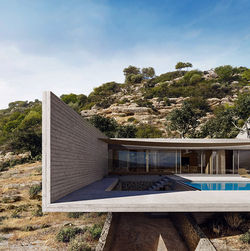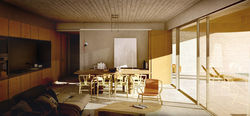top of page
 |  |  |
|---|---|---|
 |  |  |
 |  |  |
 |  |  |
 |  |  |
 |  |  |
 |  |  |
 |  |  |
 |  |
Private
Commission
Category
Residencial
Position
Lead Architect
stuctural study
Konstantinos Stathopoulos & Angelos Kioulos
civil engineer
Giorgos Sarantis
Apostolis Politis
MEP engineer
Michalis Karikis
Architecture Studio
konstantinos stathopoulos | KRAK. architects
Development
Private
2022-2023
Rodias Terra "Stories from the Rhodian Land"
The inspiration and foundation of this project stem from the land itself and the stories of its people. At the heart of the Rhodian countryside, a family envisioned creating a complex of three residences. The purpose of the project is to provide its users with an authentic connection to the local way of life, while integrating the demands of a contemporary lifestyle, a union of nature’s tranquility with the functionality of modern architecture.
The Dodecanese, and Rhodes in particular, represent a palimpsest of built space, with a history of construction dating back to prehistoric times, reaching its zenith in the Hellenistic era, and maintaining a continuous development through the late Italian occupation. After a gradual reading of the Rhodian land, an idea was born, along with a necessity to foster a dialogue, a bridge, between the old and the new.This concept became a guiding principle: to preserve and reinterpret the essence of anonymous architecture that characterizes the Rhodian landscape.
In traditional architecture, the compositional logic emerges from an additive approach, where buildings lean on one another, gradually forming a “multi-cellular organism”, a settlement. In the landscape, however, one rarely encounters isolated residences, especially of a vertical nature; only churches and windmills break the horizon in this manner. The main interventions in the landscape involve grain or livestock storage buildings and technical structures, often spread horizontally, delineating boundaries.
The retaining walls found in technical works and the light shading structures common in anonymous architecture served as the main conceptual tools in the design. The alignment of walls towards the view becomes the first symbolic and abstract gesture, marking the creation of an artificial boundary and the presence of human intervention. Following the slope, the walls “roll” towards the view, framing it.
The placement of the three residences is such that they follow the curvature of the elevation, opening toward the view and descending in an organic layout. The architectural development of Residences A and C is topographic, the exposed concrete walls emerge as traces in the landscape and evolve into retaining walls, defining the enclosed spaces and the outdoor arrangements with a light shading mesh. The composition of spaces is symbolically represented by an inverted greek letter "Π", a “life pot”. Residence B rises at the foot of the hill; two parallel walls emerge from the ground at an angle, ascending. An artificial rock is formed, leaning towards the view, reminiscent of the local goats standing on the hillside. The outcome is highlighted by the intense Greek light, merging with the landscape to create a unified environment, with distinct characteristics and harmonized spaces of living and vegetation. The arrangement of openings contributes to the feeling of the residence as a spiritual sanctuary, offering ample light, cooling, and a connection to the surrounding natural beauty. Nature unfolds before the user, following the imagined path of light. A unique play of light and shadow is created, offering distinct experiences throughout the day as the position and intensity of the sun change.
The materials draw their breath from the rocky formations of the landscape, their color and roughness. Exposed concrete glows under the brilliant Greek light, serving as a modern stone that imparts both strength and fluidity. Thus, a Doric character is achieved.
Walls and slabs are measurable, yet the human soul is not. We often encounter spaces that have correct dimensions and might be termed "functional," yet they fail to inspire the user. Nikos Kazantzakis, in Askitiki, writes that we are but fragile beings "made of mud and dreams." We covered our fragility by placing a roof over our heads for shelter, but what do we do for our dreams? A space has not only the right but also the duty to inspire its user, to challenge them, to enable their spiritual growth, and to become an architectural experience.
© konstantinos stathopoulos | KRAK. Architects
bottom of page